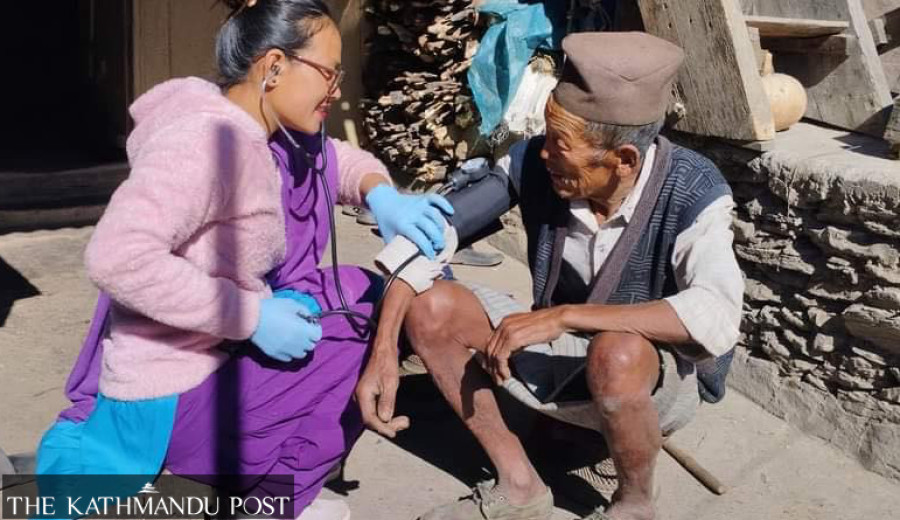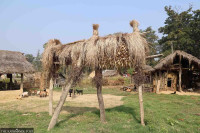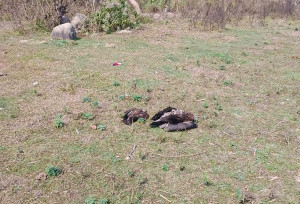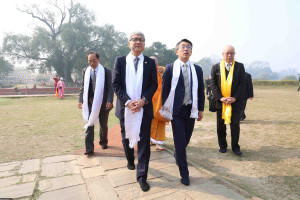Lumbini Province
Villagers elated after local unit starts door-to-door health service
The Putha Uttarganga Rural Municipality has deployed 14 auxiliary nurse midwives in each ward of the rural municipality, focusing on women, children, and the elderly.
Mahesh KC
Balaman Budha, a 63-year-old man from Pelma, Putha Uttarganga Rural Municipality-2, is an asthma patient. He has been living with the condition for more than eight years.
Despite his condition, Budha hardly visited the hospital for checkups since it required a day-long walk to reach the nearest health centre at Ward No 1 of the rural municipality. Risky foot trails and the expenses incurred during his visit to the health post deterred him from going for regular checkups, he says.
But the launch of a health programme by the rural municipality wherein a team of health professionals visit people’s doors to provide medical services has come as a huge relief for Budha and many others like him.
The rural municipality has deployed 14 auxiliary nurse midwives (ANM) in each ward of the rural municipality, mainly focusing on women, children, and the elderly.
“Before the launch of the service, I used to suffer in silence and wait until it was absolutely necessary for me to go to the health centre,” said Budha. “Now health workers come around once a month and suggest when to visit the hospital, provide free medicine for simple illnesses, and teach us the importance of a healthy lifestyle. I finally see some positive changes in the neighbourhood. This programme may not be a big deal for everybody but for us, in the villages, it’s come as a boon.”
According to Puniraj Gharti, chairman of Putha Uttarganga Rural Municipality, in coordination with Taksera Basic Hospital in ward No 1, the medical personnel of the hospital have set a target to visit every house in the assigned ward once a month. “Also the medical team is on standby for house calls in case of emergency.”
Our main priority has always been the development of the health sector in Putha Uttarganga. Other development activities can only be carried forward smoothly if the citizens are healthy,” said Gharti.
The assigned ANM in their particular ward will check the health of the locals including the disabled, pregnant, and the newborn; test them for communicable and non-communicable diseases, measure malnutrition, administer medicines to chronic patients, and provide necessary consultation among other medical assistance.
Milan Malla, medical officer of Taksera Basic Hospital said, “The ANM will also look for serious diseases among the population and ways to prevent them from getting worse. The local unit in collaboration with us is working on creating a health profile of every citizen so everyone can keep track of their health and help take preventive measures before problems become serious.”
ANM Purnima Budha, assigned to ward No. 1, said that the door-to-door health checkup campaign has made people more aware about their health.
“Every household welcomes us. At first, people used to feel shy about sharing their health conditions with us, but not anymore. They tell us about all their problems,” said Purnima.
According to Manpura Budha, a 53-year-old woman of Putha Uttarganga-12, earlier she had to walk for more than a day on a risky foot trail to reach the nearest hospital. But now she is very happy with the launch of the door-to-door health service.
“I have three sons, and all were born at home because, at that time, we didn’t know when was the right time to visit the hospital. I feel very happy to see the ANM giving advice to pregnant women and helping them during emergencies,” said Manpura.
According to Bhupendra Budha, deputy chairman of the rural municipality, under the programme, people were also provided insurance by the local unit. “The aim is also to encourage pregnant women to opt for institutional delivery for the benefit of the mother and the child.”
According to Taksera Basic Hospital, before the launch of the programme, only 40 percent of the pregnant women in the rural municipality would visit the hospital for delivery. “But things are gradually changing. We hope more pregnant women will come to the hospital for delivery. Through this programme we aim to raise awareness in rural areas about the benefits of opting for institutional birth,” said Malla, the medical officer.




 9.83°C Kathmandu
9.83°C Kathmandu















